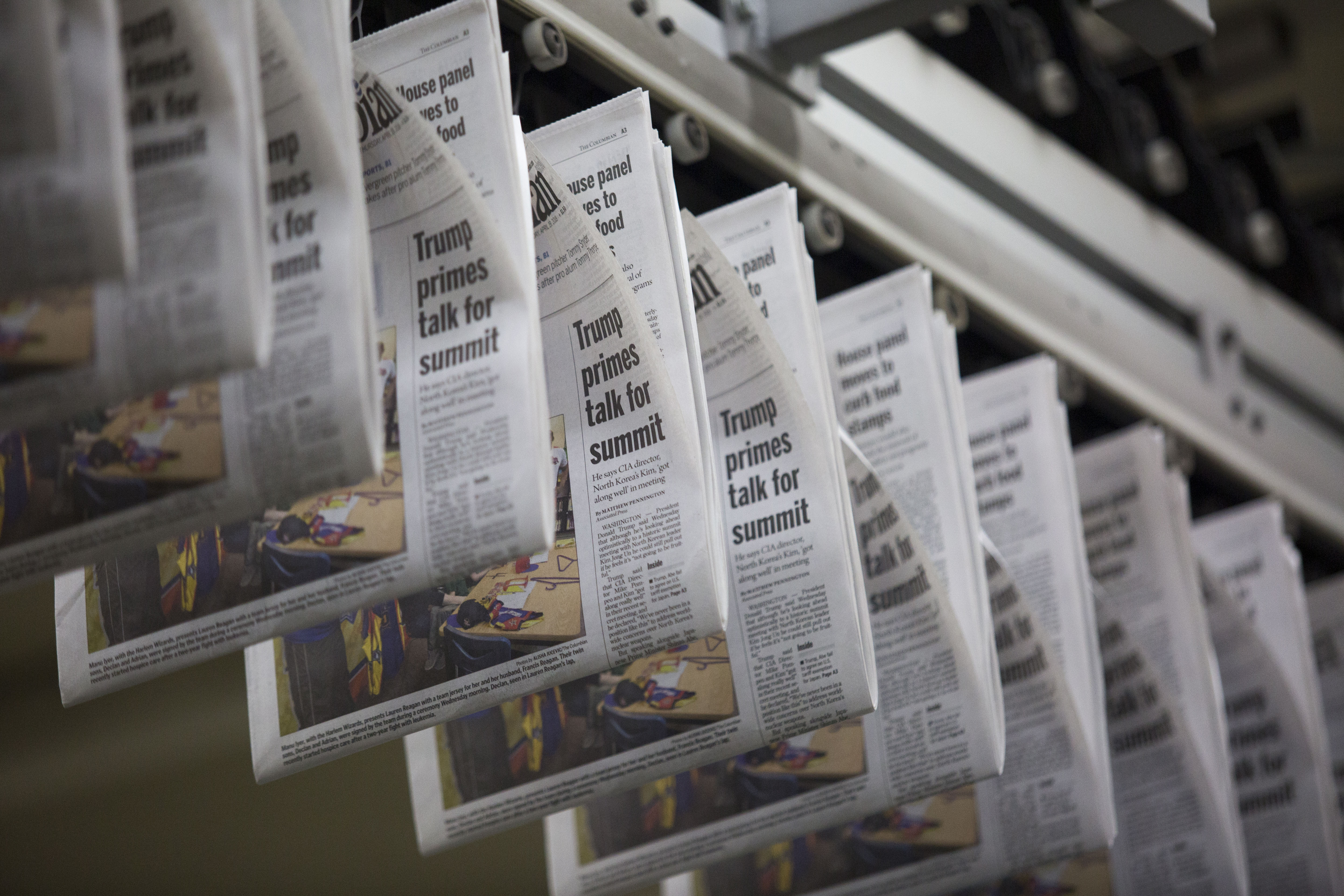Ailing US newspapers feel new pain from newsprint tariffs
US newspapers are feeling the impact of tariffs imposed on newsprint from Canada, in a case being reviewed by the quasi-judicial US International Trade Commission (NATALIE BEHRING)
Washington (AFP) – US newspapers have taken a hit from a shift to digital news and a sharp loss of advertising, but a round of tariffs on Canadian newsprint is pushing some publications to the brink.
The Commerce Department earlier this year slapped preliminary tariffs of up to 30 percent on newsprint from Canada — the largest source for US newspapers — in response to a complaint from Washington state-based North Pacific Paper Co.
Tariffs have heightened the economic woes for the US industry, notably for small dailies and weeklies facing the prospect of belt-tightening that may including cutting back print editions or slashing staff.
As newspapers reel from the current economic landscape, many have already been making hefty newsroom cuts, including a 50 percent reduction at the storied New York Daily News.
Andrew Johnson, publisher of three Wisconsin weeklies and president of the National Newspaper Association of 2,300 local community newspapers, said the tariffs are imperiling many news organizations.
“I lost some subscribers over the years. I cannot pass along another increase now without damaging my business,” Johnson told a July 17 hearing of the US International Trade Commission, the quasi-judicial agency reviewing the tariffs.
Johnson said many newspapers “are freezing all hiring and trying to cut pages or page sizes,” and that if the tariffs remain in place, some may have to shut down or sell.
Penelope Abernathy, a University of North Carolina professor who studies media economics, said many small dailies and weeklies still bring in most of their money from print, with digital subscription and ad revenues largely disappointing.
Abernathy said that since 2004, around 60 dailies and more than 1,800 weeklies have shut down in the United States, creating “news deserts” with a dearth of local coverage.
The new tariffs could lead to even more papers disappearing, she said.
“When you add on tariffs, that’s going to be the death knell for a lot of smaller newspapers that still rely on the print edition,” said Abernathy.
– Protecting or hurting? –
Several members of Congress criticized the tariffs at the ITC hearing as counterproductive and urged the panel to overturn the findings.
“The tariffs will harm the US paper industry because they will cause permanent harm to newspapers, printers, and book publishers, shrinking the US paper industry’s customer base,” said Senator Susan Collins of Maine.
Paul Tash, president and chief executive at the Tampa Bay Times newspaper, said if the tariffs remain in place it will cost his organization $3.5 million a year, “an extra cost we simply cannot absorb.”
“After payroll, newsprint is our single biggest expense, and we are cutting back there too,” Tash told the hearing.
– Already reeling –
Newspaper industry employment in the US fell from more than 400,000 in 2001 to 173,000 in 2016, according to government data, highlighting the troubles faced by the shift to digital.
Forbes Media chairman Steve Forbes, writing in The Wall Street Journal last month, said, “The killing of local newspapers by the imposition of tariffs would gut the nation’s free press.”
Craig Anneberg, CEO of North Pacific Paper, defended the tariffs that resulted from his company’s complaint, claiming unfairly subsidized imports take away US jobs.
Since the tariffs went into effect, he told the ITC, “our production is up, our capacity utilization is higher, our shipments are increasing and our profitability is up.”
Anneberg said the tariffs helped the company restart one mill and hire back 60 employees who had been laid off.
He noted that Canada now holds around 70 percent of the US market, “not because of any inherent advantage, but because of the massive assistance that Canadian producers receive from their provincial governments and the Canadian federal government.”
But Paul Boyle of the News Media Alliance, which represents some 2,000 newspapers, said an entire economic sector has been disrupted by a single complaint from a company owned by a private equity firm, without the backing of fellow paper manufacturers.
“You have one company that is manipulating our trade laws,” Boyle said. “The petition has been opposed by other US newsprint mills and their trade association, and by every publisher and printer in the United States.”
The media group, which is backed by a coalition of US publishers, paper suppliers and printers, is hoping for some relief when the Commerce Department makes a final ruling on August 2, or when the ITC rules in late August.
But Boyle said that even if the tariffs are cut or overturned, which would result in refunds to paper mills, “in our view the damage has already been done. Newspapers are not going to get their money back.”
Disclaimer: This story has not been edited by Siliconeer and is published from a syndicated feed. Siliconeer does not assume any liability for the above story. Validity of the above story is for 7 Days from original date of publishing. Content copyright AFP.


